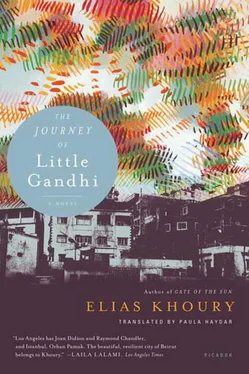Gandhi remembered the story of the lira.
He remembered when he fled from the cave, that black night, and threw himself into the cornfields and walked, he remembered that he stopped in front of Haj Ismail’s store and stole a lira from his cash register. Haj Ismail was a strange man. When he’d take the money from his customers, he’d tear the bills in half and put them in two separate piles on two sides of the register. That way no one could steal from him. When he wanted, he’d tape two halves back together. And so all the liras in the village had a piece of tape down the middle. The cash register was full of half-liras. Little Gandhi took two halves. He wasn’t sure they were the same one; he was afraid to make sure and have Haj Ismail catch him as he fiddled with the register. And then again, how could he make sure when he couldn’t even tell the face of the lira from the back side. He took the two halves and ran. He stuck them together with some glue he plucked from an almond tree and stopped a truck on the road to Halba. He waved the lira and the driver stopped. He let him ride in back between the sheaves of wheat and took him to Tripoli.
There, in the port, where the truck stopped, Gandhi saw the sea and was frightened. It was the first time in his life he saw something so huge, surging as it did, blue and colorful. He stood in front of the sea like an idiot, barely moving.
“Where are you headed?” the driver asked him.
“I don’t know. Here.”
“I’ll take you to Rashid. You can work for him as an errand boy in the bakery.”
Gandhi nodded his head in agreement and went to work there for four years. The first few months he slept at the bakery, then he moved to a room at Um Omar Hisiyyeh’s house. He paid her ten piasters and two loaves of bread every day. Um Omar was deaf, but she never made a mistake counting her money and hid it in a place only she and God knew about. There were about ten young men who slept in that room.
Gandhi found work in Tripoli thanks to that glued together lira. The driver was from the nearby village of Mashta Hammoud, and there was no question he’d told his father where he was. In the early days Gandhi was scared to death his father would come and kill him.
Master Baker Rashid’s wife, Rashida, as Gandhi used to call her, put him at ease.
“Don’t be afraid, you’re with me, if he dares come I’ll break his legs.”
Gandhi was afraid, but his father didn’t come and Gandhi didn’t die. He stayed at the bakery for many long months, four years or more, and it was there he learned about life.
Master Rashid, the dark-skinned, gray-haired, slender man, looked like a key. That’s what his wife, Um Jamal, used to say, the one Gandhi called Madame Rashida.
Madame Rashida was everything. She was in complete charge, while her husband the key did nothing. He’d sit in front of the oven, puffing away at the water pipe in front of him. Then he started running away from the bakery and going to the glass coffeehouse in Meena, where he’d spend the whole day puffing away and saying, “God help us.” He talked a lot, and only about politics. He’d talk about the Ottoman sultans as though they were his own relatives. “How great was Sultan Abd al-Hamid; but they stabbed him in the back, woman.” And the woman would sigh and tell him to worry about the price of flour. “Flour? What flour? You call this flour? You call this a country? You just don’t understand.” Then he’d go to his coffeehouse and wonder about this “Grand Liban” that was ultimately put together.
“Grand, my foot. May God make it smaller. What’s so grand about it? We didn’t want it that way. But what do we want anyway?”
That’s what he did all day at the coffeehouse; he’d sit with a group of men puffing away at the water pipe and talking about how things had been turned upside down. They’d end up fighting over checker games, and when he’d return to the bakery tired at three in the afternoon, when Um Jamal was giving out the work orders for preparing the flour to make the night’s dough, he’d come out of the blue with a question about political events and she’d shut him up with a wave of her hand. She’d dish out a plate of food for him. He’d eat in the bakery, sweat dripping from him, and then he’d go home to sleep. And Um Jamal ordered everyone around. Gandhi, who wasn’t called Gandhi at the time (actually, they called him Abd), would stand there like a slave at her command. Abd would come hungry and exhausted after he finished delivering the packages of bread. She’d give him one loaf filled with yesterday’s leftovers and two loaves for the deaf woman, and his daily earnings of half a lira. “Get going, God be with you, son,” she’d tell him. Then she’d repeat the story of her son Jamal. “He’s a loafer. He hates to work. But you, you’re a real hard worker. I love you like a son. You’re a little rascal.” She’d look him up and down, as if she were trying to find out how much he made in tips from the houses he delivered bread to.
“I swear I don’t have a piaster, Aunt, I’m broke.”
Abd thought she was going to attack him to search through his pockets, but she didn’t. She smiled, showing her yellow-black teeth and the gap that was left after two decayed teeth were extracted. “You’re a son of a gun,” she’d say to him. From that day on Gandhi was convinced he was a son of a gun. Otherwise, how would he have survived? No one could live in this country except a son of a gun.
He took a matchstick and struck it against his matchbox and began to whistle.
“It’s ten piasters for an order of labneh, or there’s no labneh,” he said to the customers in his restaurant who were sitting on a stone bench in front of the door. He’d set down a glass of arak in front of him in his house in Nabaa, while around him sat a group of Kurdish and Hurani workers who’d become regular customers of this thirdclass restaurant Gandhi opened at the expense of Mr. Davis’s dog. It had become very popular. The stone benches transformed into a real restaurant with cushions all over the floor.
“Those were the days,” Gandhi said to the Reverend Amin, who stood before him like a statue, with his black shoes up on the shoe-shine box.
“Keep polishing, my son. God love you. You’re a good boy. Why don’t you come to church?”
“God forbid, Reverend. I believe in God,” Gandhi would answer.
“Isn’t the Church the house of God? Don’t you know your Qur’an? ‘And nearest among them in love to the Believers wilt thou find those who say “We are Christians” ’ Come and take a look. What have you got to lose?”
And because Gandhi was a son of a gun, he decided to go and take a look.
The Reverend Amin wasn’t a pastor of the formal and dignified Evangelical church located in Zuqaq al-Blat; rather, he led the parish of a small church on Makhoul Street. It was more like a house that had been converted into a church. The story of the Reverend Amin and his church was complicated. He was a real Reverend. He became one after studying history and theology at the American University and was appointed an itinerant pastor by the evangelical synod. Amin was a zealous young man. He took this appointment as being called on a mission for Christianity. He saw himself as one of Jesus’ disciples, traveling throughout Lebanon and dying like the first martyrs. And so, on his way from Sidon to Beirut, Amin Aramouni discovered that the world belonged to him, and that he belonged to a future constructed out of knowledge and faith. That’s what the American evangelists taught him with their wisdom and kindness. He came to the church from the depths of poverty. He believed that Christ’s salvation meant the salvation of the whole world, and that America was the model of this new world that Christ had saved. He was twelve when famine struck Sidon during the First World War. The Reverend Amin didn’t remember anything from those difficult years except the famine. He used to go with his father the cobbler to buy bread. He’d hold his father’s hand firmly, because he was afraid his fast-paced father would leave him to the famine and have one less mouth to feed. On the sides of the streets of Sidon he’d see men and women with bloated bellies, screaming with hunger. That is when he learned not to give to anyone. He wasn’t stingy, but he never gave. He learned you can’t share your food with anybody, or you’ll die. And when the Reverend Amin became a pastor in Ras Beirut, after the small schism that took place in the church of Beirut, he continued to feel that he had to hold on to each mouthful and couldn’t share it with anyone. His wife, Eugenie, the Reverend Nabil Khoury’s daughter, couldn’t understand his stinginess. He was frugal about everything in the house except his whiskey. The children’s clothes were the subject of many an argument. He’d travel through the various districts and come to Beirut at the beginning of the week to stay with his wife for a couple of days.
Читать дальше












